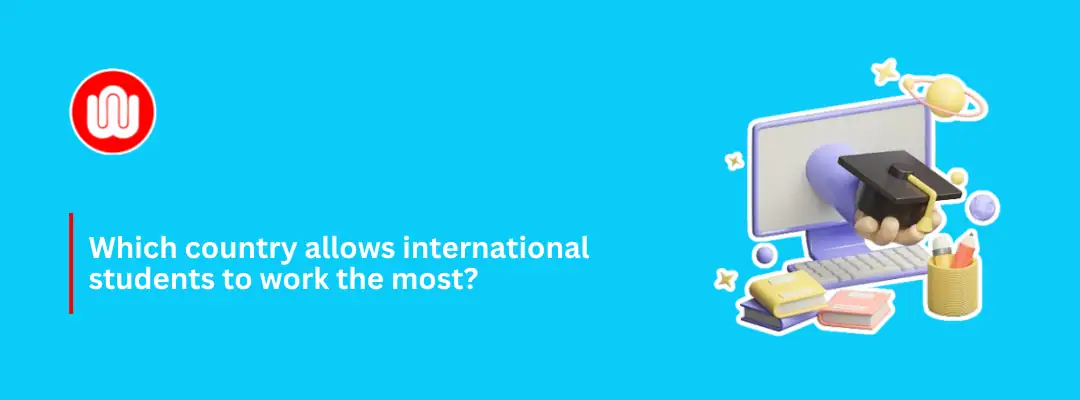Studying abroad is a life-changing experience.
It offers international students a unique opportunity to immerse themselves in a new culture, gain a global perspective, and learn from renowned institutions.
But let’s face it - studying abroad can sometimes be a burden on the pockets. To counter this, a majority of international students rely on part-time jobs to manage their daily expenses and academic costs. According to statistics, nearly 63% of international students reported working in an on/off-campus part-time job during their studies.
However, the number of hours international students are allowed to work varies greatly from country to country. While some countries have strict limits on total work hours, others offer more flexible rules which allow students to work longer and earn more.
1. Sweden - No Limit
Sweden has no legal limit on study time or work hours for international students. Students are expected to spend at least 40 hours/week on their studies. Students who wish to stay in Sweden after their studies must apply for a Work Permit.
2. Australia - 48 Hours/2 Weeks
According to the Department of Home Affairs (DHA), Student Visa holders can work up to 48 hours/2 weeks while studying. The department also confirms that international students with a valid study visa have no work restrictions during their breaks from their course of study.
3. Finland - 25 Hours/Week
Only international students from non-EU and non-EEA countries require a Work Permit to work in Finland. During their term, students can work for up to 25 hours/week – and work full-time during their holidays/semester breaks.
4. Canada - 24 Hours/Week
The Canadian government recently updated their work-hour policy for international students. According to the new policy, students with a Canada Study Visa, are allowed to work for up to 24 hours/week of off-campus employment during their academic year. Moreover, students can work full-time during their academic breaks.
5. France - 21 Hours/Week
France permits foreign students to work up to 964 hours annually, averaging 21 hours/week. However, international students seeking employment on-campus are allowed to work a maximum of 670 hours from September 1st to June 30th, and up to 300 hours from July 1st to August 31st.

6. Ireland - 20 Hours/Week
Ireland provides flexibility for students to engage in part-time work. Throughout their course, students can work up to 20 hours/week. This limit increases to 40 hours during specific vacation periods spanning from June to September and from December 15th to January 15th.
7. United States - 20 Hours/Week
International students with a valid Student Visa can work for up to 20 hours/week on campus. Whereas for off-campus, students can work for up to 20 hours/week during their course and full-time during annual breaks, when school is not in session.
8. Germany - 20 Hours/Week
International students in Germany enjoy similar rights to those of German students. Students from EU and EEA countries can work for up to 20 hours/week during their semesters. Whereas, no-EU students are allowed to work 120 full days or 240 half days each year.
9. New Zealand - 20 Hours/Week
Depending on the program of study, international students can work in part-time jobs for up to 20 hours/week. There are no restrictions on working hours during spring and summer breaks. You can work up to 40 hours a week during the summer break.
10. United Kingdom - 10-20 Hours/Week
International students in the United Kingdom with work permission must make sure that they do not exceed the allowed work limit of 10 to 20 hours/week. It is advised that students verify any work limits set by their university/institution.
Take note that in-depth research on your specific study-abroad destination is important. You must understand the work regulations which will allow you to do financial planning, choose the right visa, maintain a balanced student lifestyle and target job opportunities. The process can be a bit challenging, especially for first-timers. With the guidance of the study abroad consultants in Hyderabad at Nationwide Visas, you can get the best solutions to make a well-informed decision.
Call us@ +91 92 92 92 92 81 or email us at info@nationwidevisas.com
Start your process today!
Read More: Study Visa to Canada PR: Step-By-Step Guide
Related Posts
Enquire Now
How to Bring your Parents to Canada?
02 Feb, 2023 | 04:57 PM 3657105
Is Canada a Better Place to Live than the UK?
08 Sep, 2022 | 03:50 PM 231801
What's the next step after biometrics for Canada Study Visa?
16 Jun, 2022 | 05:44 PM 205269
How much funds are required for a Study Visa in Canada?
11 May, 2022 | 11:43 AM 195941
Apply for Luxembourg Work Permit from India
22 Nov, 2024 | 04:46 PM 195285
Top 5 Canada PNP Accepting UAE-Based Applicants
05 Jul, 2025 | 05:35 PM 330
How to Secure a Canadian Job Offer from the UAE for PNP?
04 Jul, 2025 | 04:56 PM 1074
Common Express Entry Mistakes Made by UAE Residents and How to Avoid Them?
01 Jul, 2025 | 04:19 PM 3457
How to Apply for Ontario PNP from the UAE?
28 Jun, 2025 | 05:29 PM 5051
Canada PNP Without Job Offer: Is It Possible for UAE Residents?
26 Jun, 2025 | 04:55 PM 6383
Stay up to date with latest news
Comments
We welcome your feedback
Your email address will not be published. Required fields are marked *